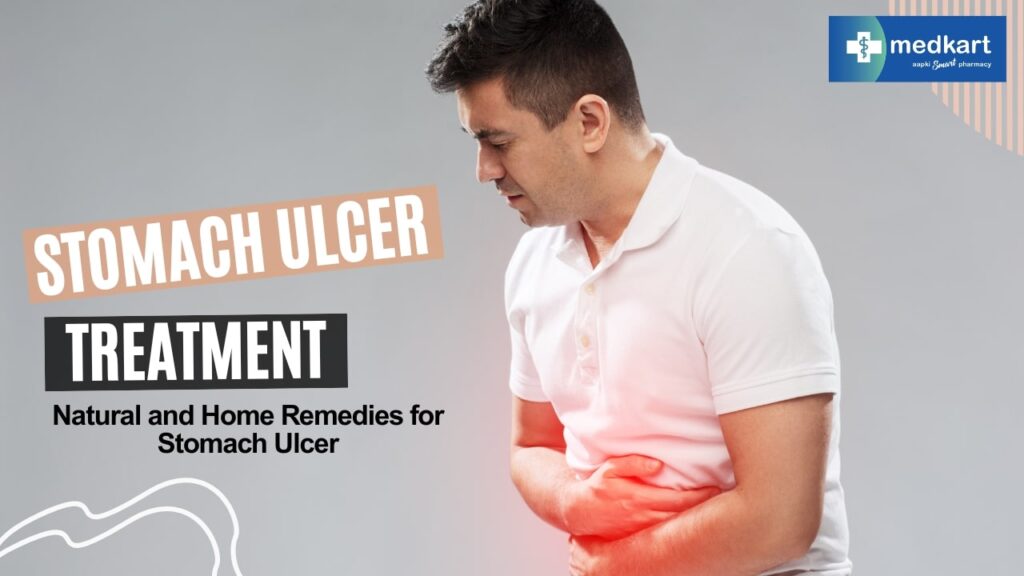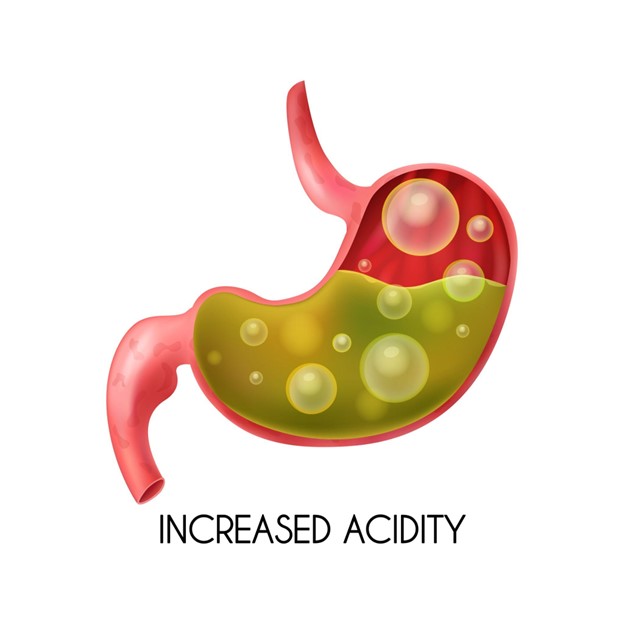Last updated on April 14th, 2025 at 04:44 pm
 Stomach ulcer treatment typically involves a multifaceted approach aimed at relieving symptoms, promoting healing, and preventing recurrence. Medications play a central role, with proton pump inhibitors (PPIs) and H2 blockers effectively reducing stomach acid production. Antibiotics for stomach ulcer treatment may be prescribed in cases where Helicobacter pylori infection is identified. Antacids provide quick relief by neutralizing acid, while cytoprotective agents form a protective barrier over the ulcer.
Stomach ulcer treatment typically involves a multifaceted approach aimed at relieving symptoms, promoting healing, and preventing recurrence. Medications play a central role, with proton pump inhibitors (PPIs) and H2 blockers effectively reducing stomach acid production. Antibiotics for stomach ulcer treatment may be prescribed in cases where Helicobacter pylori infection is identified. Antacids provide quick relief by neutralizing acid, while cytoprotective agents form a protective barrier over the ulcer.
Lifestyle modifications, such as dietary changes to avoid trigger foods and the cessation of smoking, contribute to the healing process. Stress management through techniques like meditation or yoga is also recommended, as chronic stress can exacerbate symptoms. In severe cases or instances of complications, surgical intervention may be necessary.
What are Stomach Ulcers?
Gastric ulcers, commonly referred to as stomach ulcers, are characterized by the presence of open sores that form on the inner lining of the stomach. These ulcers can cause pain, discomfort, and various complications if left untreated. Stomach ulcers primarily result from the erosion of the stomach lining, often caused by the imbalance between stomach acid and the protective mucous layer.
The major factors contributing to ulcer development include:
- Helicobacter pylori (H. pylori) Infection: This bacterium is a common culprit behind stomach ulcers. It weakens the protective mucous layer, making the stomach more susceptible to damage from stomach acid.
- Nonsteroidal Anti-Inflammatory Drugs (NSAIDs): Regular use of NSAIDs, such as aspirin and ibuprofen, can increase the risk of developing stomach ulcers by irritating the stomach lining.
- Excessive Stomach Acid Production: Conditions like hyperacidity can lead to an excess of stomach acid, contributing to the erosion of the stomach lining.

Stomach Ulcer Symptoms Treatment
Recognizing the symptoms of stomach ulcers is crucial for timely intervention. Common signs include:
- Burning pain in the abdomen, often between meals or during the night.
- Nausea and vomiting.
- Indigestion and bloating.
- Dark or bloody stools.
- Unexplained weight loss.

Stomach Ulcer Treatment
The features of the treatment of stomach ulcers are mentioned below:
Medications:
- Proton Pump Inhibitors (PPIs): These drugs reduce stomach acid production, promoting healing of the ulcer. Examples include omeprazole and lansoprazole.
- H2 Blockers: Drugs like ranitidine and famotidine also help decrease stomach acid production.
- Antibiotics: If H. pylori infection is identified, a combination of antibiotics is often prescribed to eradicate the bacteria.
> Consult a Doctor and Medkart will help you Order Medicines Online
Antacids: Over-the-counter antacids provide quick relief by neutralizing stomach acid. However, they do not promote ulcer healing and are typically used in conjunction with other medications.
Cytoprotective Agents: Medications like sucralfate create a protective barrier over the ulcer, shielding it from the corrosive effects of stomach acid.
Lifestyle Changes:
- Dietary Modifications: Avoiding spicy foods, caffeine, and alcohol can help reduce stomach acid production.
- Quitting Smoking: Smoking can delay ulcer healing and increase the risk of complications.
Stress Management: Chronic stress can exacerbate stomach ulcer symptoms. Practising relaxation techniques like meditation or yoga may help manage stress levels.
Surgery: In severe cases or if complications arise, surgery may be necessary to repair the ulcer or remove the affected portion of the stomach.
Also, Read:
- Latest Schizophrenia Treatment
- Plantar Fasciitis Treatment
- Best Pimple Treatment
- Normal Heart Rate by Age
- Home Remedies for Loose Motion
Stomach Ulcer Treatment Diet
Adopting a stomach ulcer treatment diet is essential for managing symptoms and promoting healing. Key dietary considerations include:
- Avoiding Trigger Foods: Spicy foods, acidic fruits, caffeine, and alcohol can irritate the stomach lining. Limiting or avoiding these items can help reduce discomfort.
- Opting for a Low-Acidity Diet: Choose foods that are less acidic to minimize stomach irritation. Choose lean proteins, opt for whole grains, and include non-citrus fruits in your dietary selection.
- Incorporating Fiber-Rich Foods: High-fiber foods, such as fruits, vegetables, and whole grains, can help maintain a healthy digestive system and prevent constipation.
- Including Probiotics: Probiotics, found in yoghurt and fermented foods, promote a healthy gut environment and may aid in the healing process.
- Small, Frequent Meals: Eating smaller, more frequent meals throughout the day instead of large meals can help manage stomach acid levels and reduce irritation.
- Hydration: Drinking plenty of water helps maintain mucous production, providing a protective barrier for the stomach lining.
It’s crucial to note that individual responses to foods can vary, and individuals with stomach ulcers should consult with a healthcare professional or a registered dietitian to craft an individualized dietary regimen that caters to unique needs and preferences.
Conclusion:
Stomach Ulcer treatment is a combination of medications, lifestyle changes, and, in some cases, surgery. Early detection and intervention are essential for preventing complications and promoting optimal healing. If you suspect you have a stomach ulcer or experience persistent symptoms, consult a healthcare professional for a proper diagnosis and personalized treatment plan.
Read: What are Generic Medicines?
FAQs on Stomach Ulcer Treatment
Q1. What is stomach ulcer treatment?
Stomach ulcer treatment involves a combination of medications, such as proton pump inhibitors and antibiotics for H. pylori eradication. Implementing alterations to one’s lifestyle, encompassing dietary adjustments and effective stress management strategies assumes a pivotal role in overall well-being. In severe cases, surgery may be considered to address complications or non-responsive ulcers.
Q2. Can stomach ulcers heal on their own without treatment?
In some cases, small ulcers may heal without specific treatment. However, seeking medical advice is crucial to prevent complications and ensure effective management.
Q3. What over-the-counter medications can help with stomach ulcer symptoms?
Antacids, such as Tums or Maalox, provide quick relief by neutralizing stomach acid. However, they should be used in conjunction with prescribed medications for long-term ulcer healing.
Q4. Is surgery always required for treating stomach ulcers?
Surgery is not always necessary. Most ulcers can be effectively managed with medications, lifestyle changes, and when applicable treatment for underlying causes like H. pylori infection. Surgical intervention is generally reserved for instances of heightened severity or the emergence of complications.
Related Links:
-
- Maximum Delay in Periods if not Pregnant
- Random Blood Sugar Normal Range
- How to Reduce Face Fat?
- Maximum How Many Days to confirm Pregnancy?
- How to Increase Sperm Count?
- BP Normal Range for Female
- DM Full Form in Medical
- How To Grow Hair Faster?
- Why Prescription by Brand Name is Dangerous?
- How to Remove Black Spots on Face?
